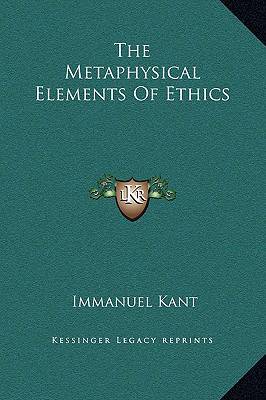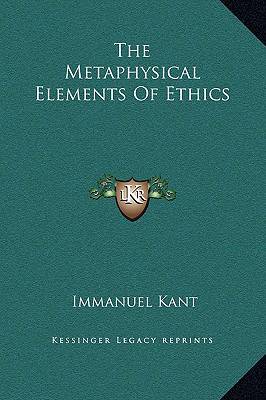
- Retrait gratuit dans votre magasin Club
- 7.000.000 titres dans notre catalogue
- Payer en toute sécurité
- Toujours un magasin près de chez vous
- Retrait gratuit dans votre magasin Club
- 7.000.0000 titres dans notre catalogue
- Payer en toute sécurité
- Toujours un magasin près de chez vous
Description
The Metaphysical Elements of Ethics is a philosophical treatise written by Immanuel Kant, one of the most influential philosophers in Western history. The book explores the nature of morality, ethics, and human behavior, and argues that moral principles are based on reason rather than emotion or instinct.Kant's central argument is that moral principles are universal and objective, and that they are grounded in the fundamental nature of human reason itself. He argues that moral principles are not based on personal preferences or cultural norms, but are instead rooted in the very structure of human consciousness.The book is divided into three main sections. The first section explores the concept of duty, arguing that moral actions are those that are performed out of a sense of duty rather than self-interest or personal gain. The second section explores the concept of virtue, arguing that moral actions are those that are performed out of a sense of respect for the inherent worth and dignity of all human beings. The final section explores the concept of the highest good, arguing that the ultimate goal of human existence is the attainment of a state of moral perfection.Throughout the book, Kant uses his characteristic style of dense, rigorous argumentation to explore complex philosophical concepts. The Metaphysical Elements of Ethics is widely regarded as one of the most important works in the history of moral philosophy, and has had a profound influence on subsequent philosophical thought.These are such moral qualities as, when a man does not possess them, he is not bound to acquire them. They are: the moral feeling, conscience, love of one's neighbour, and respect for ourselves (self-esteem). There is no obligation to have these, since they are subjective conditions of susceptibility for the notion of duty, not objective conditions of morality.This scarce antiquarian book is a facsimile reprint of the old original and may contain some imperfections such as library marks and notations. Because we believe this work is culturally important, we have made it available as part of our commitment for protecting, preserving, and promoting the world's literature in affordable, high quality, modern editions, that are true to their original work.
Spécifications
Parties prenantes
- Auteur(s) :
- Editeur:
Contenu
- Nombre de pages :
- 44
- Langue:
- Anglais
Caractéristiques
- EAN:
- 9781169199880
- Date de parution :
- 10-09-10
- Format:
- Livre relié
- Format numérique:
- Genaaid
- Dimensions :
- 178 mm x 254 mm
- Poids :
- 299 g

Les avis
Nous publions uniquement les avis qui respectent les conditions requises. Consultez nos conditions pour les avis.






